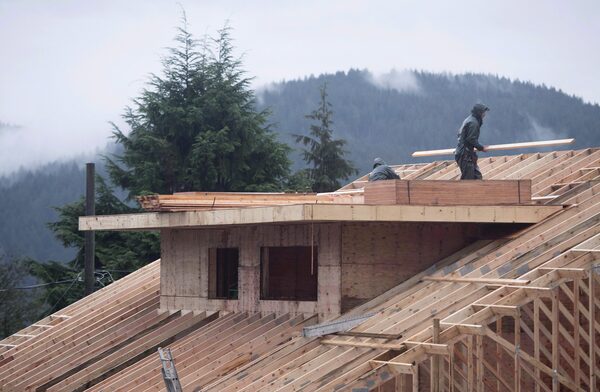
Builders work on a new home in North Vancouver, B.C., on Oct. 27, 2016.JONATHAN HAYWARD/The Canadian Press
The annual pace of housing starts picked up in March after a sharp slowdown in February, Canada Mortgage and Housing Corp. said Monday.
The national housing agency said the seasonally adjusted annual rate of housing starts climbed to 192,527 units in March, compared with 166,290 units in February.
Economists on average had expected an annual pace of 196,500, according to Thomson Reuters Eikon.
The reading came as starts of urban multiple-unit projects such as condominiums, apartments and townhouses increased 18.6 per cent to 135,894 units in March.
The rate of single-detached urban starts rose 12.1 per cent to 42,139 units, while rural starts were estimated at a seasonally adjusted annual rate of 14,494 units.
“There’s no doubt the Canadian housing market has slowed in the past year, but the latest data on construction suggests the downward trend is stabilizing,” wrote Sal Guatieri, senior economist at BMO Nesbitt Burns. “We still see starts hovering around, or even just above, 200,000 this year, marking a small step back from last year while remaining historically high.”
The six-month moving average of the monthly seasonally adjusted annual rate of housing starts was 202,279 in March compared with 202,039 in February.
Rising mortgage rates and tighter lending rules have weighed on home sales in recent months, however the federal government made changes in the federal budget in an effort to help first-time homebuyers.
Ottawa is proposing to pick up 5 per cent of a mortgage on the purchase of an existing home, in exchange for a share of the home’s ownership, for households that earn less than $120,000 and have been approved for a mortgage no more than four times their income – or 10 per cent, if the house is new.
The amount first-time buyers, and a few others in special circumstances, are allowed to borrow from an RRSP account to buy a home was also increased to $35,000 from $25,000.
However, a poll done for Royal Bank of Canada found that 56 per cent of Canadians say it’s better to wait until next year to purchase a home and 45 per cent of those who said they would wait until next year are prepared to push the purchase out two years or more.
The report found that 47 per cent of prospective home buyers said they planned to put more than 15 per cent down on their purchase, up 10 percentage points from 2018.
The bank’s annual home ownership poll was conducted by Ipsos from Jan. 9 to Jan. 21 and Feb. 14 and 15 and included 2,223 Canadians who completed their surveys online.